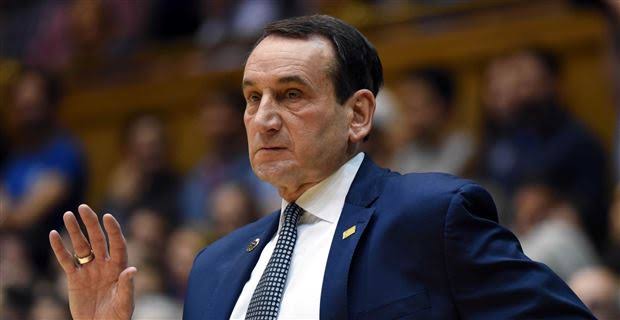Coach K Under Fire: Allegations of Verbal Abuse Surface, Raising Questions About Conduct in College Basketball

The legacy of college basketball legend Mike Krzyzewski, widely known as Coach K, has come under scrutiny as allegations of verbal abuse have surfaced, casting a shadow on his distinguished career. Known for leading Duke University’s basketball team to five NCAA championships and shaping countless young athletes, Coach K has been a symbol of excellence and discipline in college basketball. However, recent claims by former players and staff have ignited a conversation about his coaching methods, sparking debates among fans, alumni, and the sports community about where the line should be drawn between tough coaching and abusive behavior.

The Allegations: What’s Being Claimed?
The allegations against Coach K revolve around his interactions with players during practices, games, and in private settings. Former players who have come forward claim that Krzyzewski’s intense coaching style crossed the line into verbal abuse, with instances of belittling comments, profanity, and harsh criticisms that they say created a toxic environment. Sources close to the program suggest that some of these incidents left players feeling humiliated, impacting their mental health and overall experience as student-athletes.
In one account, a former player, who chose to remain anonymous, described moments when he was publicly berated in front of teammates, feeling more “broken down than built up.” Another former staff member reported instances where Krzyzewski’s language and tone were “unnecessarily harsh,” adding that they saw players struggle with confidence as a result of his approach.
While some of these claims are still unverified, the accounts have raised concerns about the culture within Duke’s basketball program, and whether Coach K’s approach may have left a lasting negative impact on some players. Given the heightened awareness of mental health in sports, these allegations are being taken seriously by both the university and the wider sports community.
The Thin Line Between Tough Coaching and Verbal Abuse
Coach K’s coaching style has long been regarded as intense and demanding, a characteristic shared by many successful coaches. Throughout his career, he’s been known for pushing his players to their limits, instilling discipline, and emphasizing resilience. Proponents argue that this approach has contributed to the competitive nature and success of the Duke program, leading to NBA-caliber players who are mentally tough and resilient.
However, the line between constructive criticism and verbal abuse can be thin, and for some players, the intensity may have crossed into harm rather than motivation. Psychologists and sports experts emphasize that while discipline and accountability are important, consistent negative reinforcement, particularly in public, can damage a player’s self-worth and motivation.
The revelations about Krzyzewski’s alleged treatment of players have also reignited debates about what is acceptable within a competitive environment, especially in college sports where athletes are still developing both mentally and emotionally. With sports programs under greater scrutiny, many institutions are now re-evaluating coaching practices to ensure they prioritize athlete well-being alongside performance.
Supporters Defend Coach K’s Legacy and Approach
In the wake of the allegations, numerous former players and colleagues have stepped up to defend Coach K, attesting to his dedication to his players and the values he instilled both on and off the court. NBA star and Duke alumnus Zion Williamson shared his respect for Krzyzewski, saying, “He was hard on us, but it was always to make us better.” Other former players have echoed similar sentiments, attributing their professional success to Coach K’s disciplined approach.
Supporters of Krzyzewski argue that his method of pushing athletes is a hallmark of great coaching and that the modern emphasis on athlete mental health and well-being has sometimes led to misunderstandings of traditional coaching tactics. They believe that Krzyzewski’s style reflects his commitment to developing strong, well-rounded players who are prepared to handle the demands of professional sports.
Duke University’s Response and the Growing Role of Mental Health in Sports
In response to the allegations, Duke University has issued a statement acknowledging the concerns and promising to investigate the claims. The university has emphasized its commitment to ensuring a supportive environment for student-athletes and has pledged to conduct a thorough review of the program’s practices and policies. Given Coach K’s retirement, the allegations primarily concern his historical behavior, but they have nonetheless prompted the university to revisit its coaching standards and player support systems.
The case has also brought mental health in sports into sharper focus, an area that has gained more attention in recent years. High-profile athletes such as Naomi Osaka, Michael Phelps, and Simone Biles have opened up about their mental health struggles, helping to destigmatize conversations around the pressures of competitive sports. The allegations against Krzyzewski underscore the importance of mental health considerations in coaching practices, with more programs now hiring mental health professionals to support their athletes.
What’s Next for Coach K and the Legacy of Duke Basketball?
For Coach K, the allegations may tarnish aspects of his celebrated career, but his overall legacy in college basketball remains significant. He transformed Duke into a powerhouse, mentored numerous NBA players, and is one of the most respected figures in the sport. Whether the allegations will have lasting effects on how his career is remembered remains uncertain, but the discourse they’ve sparked has encouraged the sports world to re-evaluate coaching methods.
As for Duke Basketball, the program’s new leadership faces the challenge of building upon Krzyzewski’s success while ensuring that players feel valued and supported. These allegations may lead to deeper evaluations of coaching strategies and a potential shift toward a more holistic approach to athlete development.
### The Broader Implications for College Sports
The situation also sheds light on the culture of college sports as a whole. The high stakes and intense competition within programs often lead coaches to adopt extreme tactics, sometimes at the expense of athletes’ mental health. As this story continues to develop, it could drive other programs to proactively address the balance between discipline and well-being, potentially reshaping coaching standards across collegiate athletics.
In the end, the allegations against Coach K have ignited an essential conversation about the responsibilities coaches have toward their players, especially young student-athletes who are at formative stages of their lives and careers. Whether or not these claims are substantiated, the story serves as a reminder that success in sports must be balanced with respect for the individual, fostering a culture where athletes can thrive both on and off the court.



